牛津深圳版七年级下册 8.3 Unit 8 Grammar(课件)
文档属性
| 名称 | 牛津深圳版七年级下册 8.3 Unit 8 Grammar(课件) |

|
|
| 格式 | pptx | ||
| 文件大小 | 2.3MB | ||
| 资源类型 | 试卷 | ||
| 版本资源 | 牛津深圳版 | ||
| 科目 | 英语 | ||
| 更新时间 | 2023-05-17 15:38:24 | ||
图片预览

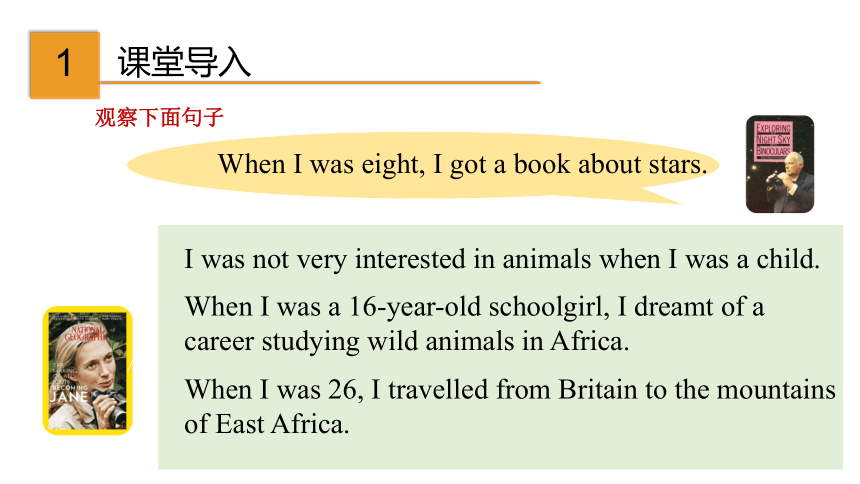
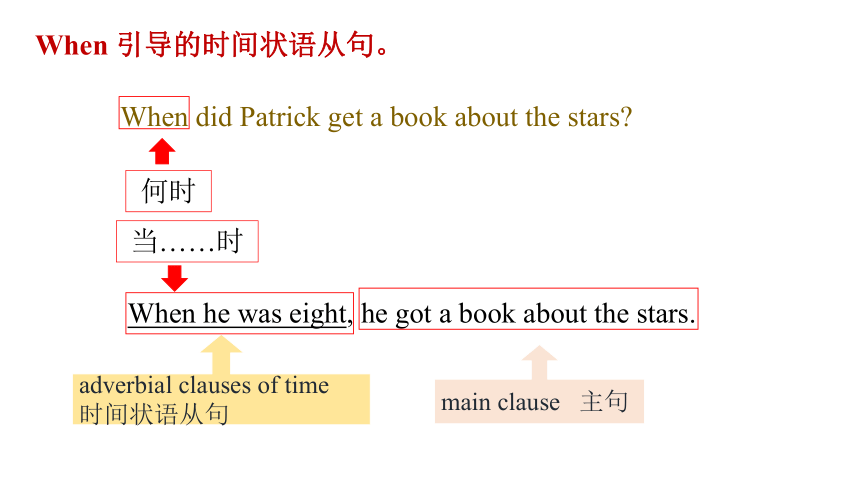
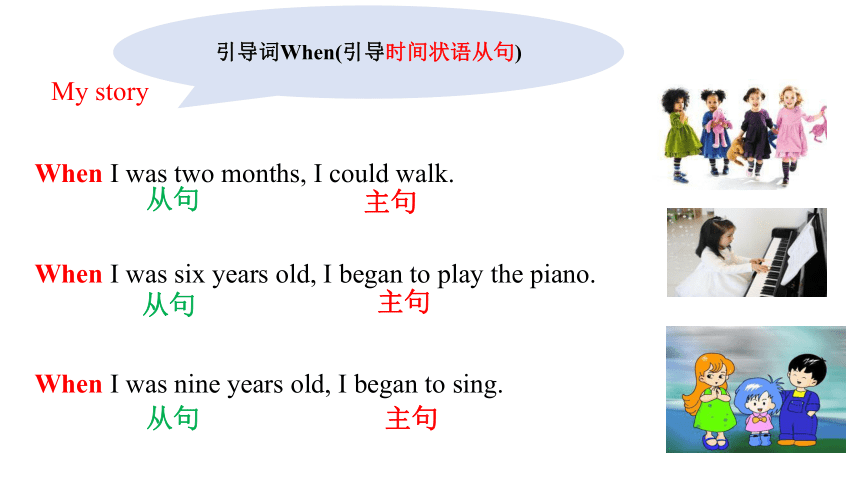

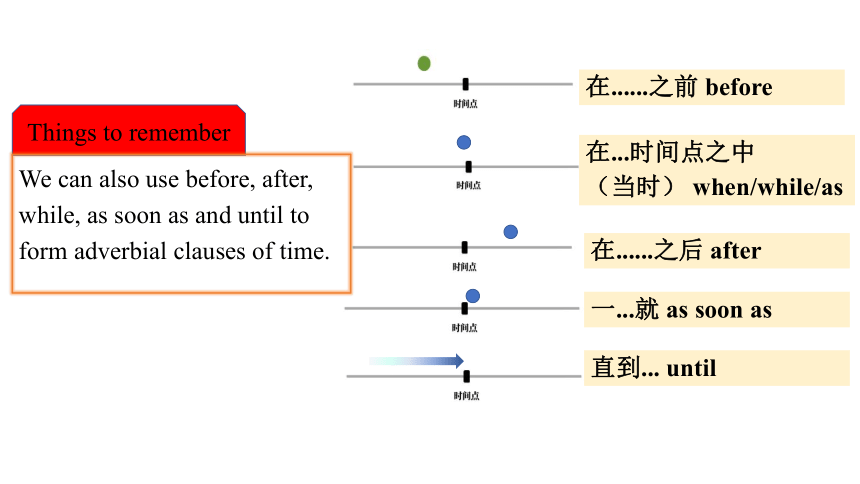
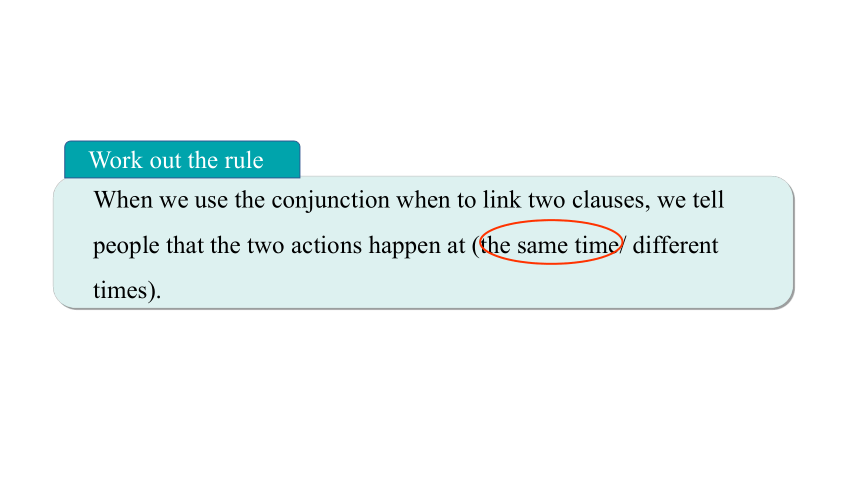

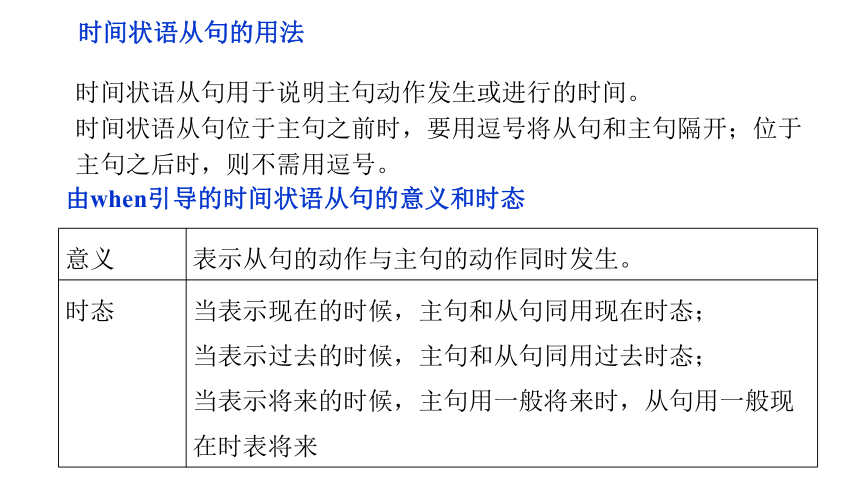
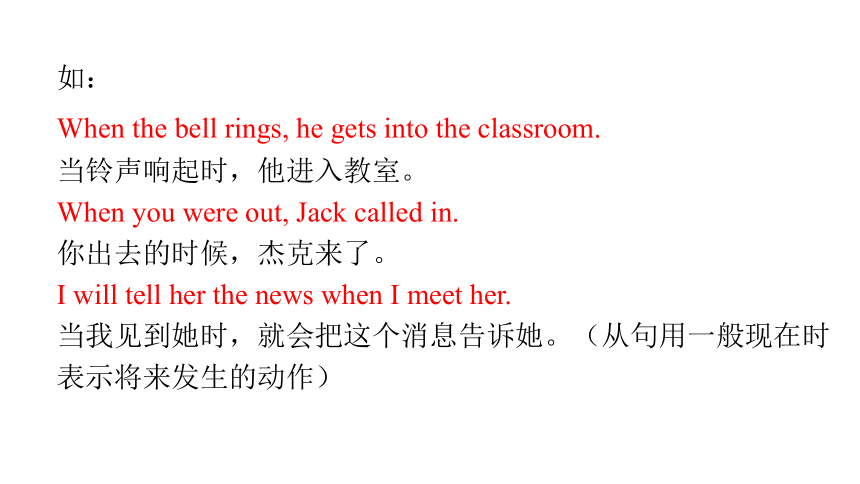
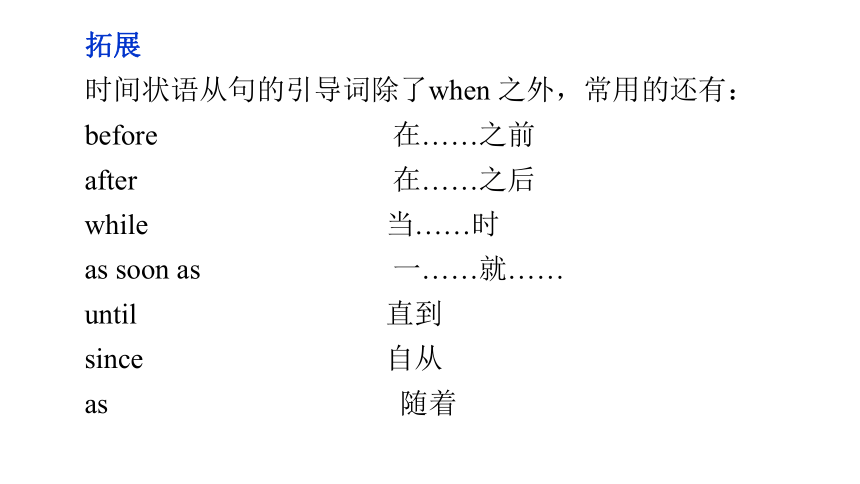
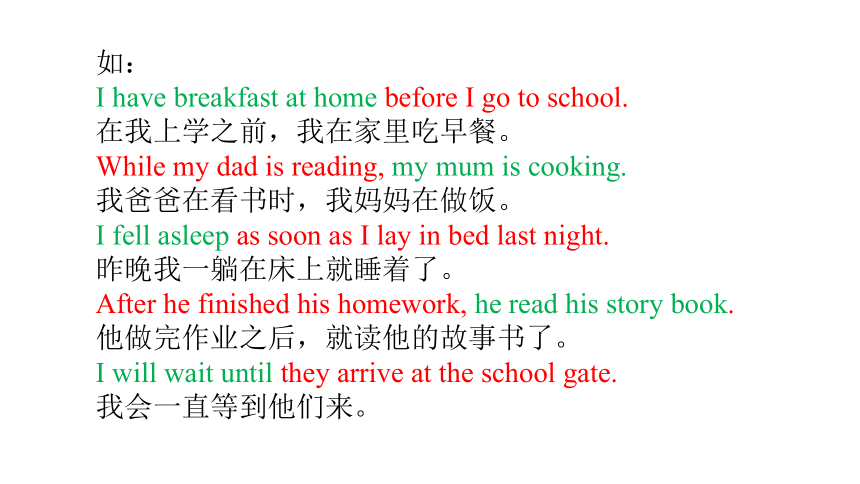
文档简介
(共34张PPT)
Unit 8
From hobby to career
Grammar
牛津深圳版七年级下册
观察下面句子
1
课堂导入
When I was eight, I got a book about stars.
I was not very interested in animals when I was a child.
When I was a 16-year-old schoolgirl, I dreamt of a career studying wild animals in Africa.
When I was 26, I travelled from Britain to the mountains of East Africa.
When did Patrick get a book about the stars
When he was eight, he got a book about the stars.
何时
当……时
adverbial clauses of time
时间状语从句
main clause 主句
When 引导的时间状语从句。
When I was two months, I could walk.
My story
When I was six years old, I began to play the piano.
When I was nine years old, I began to sing.
主句
从句
从句
从句
主句
主句
引导词When(引导时间状语从句)
We can use the conjunction when to form an adverbial clause
of time. It links two clauses into one sentence.
When I was eight, I got a book about stars.
When the girl got older, she sailed the boat herself.
A Adverbial clauses of time (when)
2
课堂活动
在......之前 before
在...时间点之中
(当时) when/while/as
在......之后 after
一...就 as soon as
直到... until
Things to remember
We can also use before, after, while, as soon as and until to form adverbial clauses of time.
When we use the conjunction when to link two clauses, we tell people that the two actions happen at (the same time/ different times).
Work out the rule
We can put an adverbial clause of time at the beginning or the end of a sentence.
时间状语从句可以在句首,也可以在句末。时间状语从句位于主句之前时,要用逗号将从句和主句隔开;位于主句之后时,则不需用逗号。
He got a book about the stars when he was eight.
When he was eight, he got a book about the stars.
main clause
Adverbial clause of time
Adverbial clause of time
Main clause
由when引导的时间状语从句的意义和时态
意义 表示从句的动作与主句的动作同时发生。
时态 当表示现在的时候,主句和从句同用现在时态;
当表示过去的时候,主句和从句同用过去时态;
当表示将来的时候,主句用一般将来时,从句用一般现在时表将来
时间状语从句用于说明主句动作发生或进行的时间。
时间状语从句位于主句之前时,要用逗号将从句和主句隔开;位于主句之后时,则不需用逗号。
时间状语从句的用法
如:
When the bell rings, he gets into the classroom.
当铃声响起时,他进入教室。
When you were out, Jack called in.
你出去的时候,杰克来了。
I will tell her the news when I meet her.
当我见到她时,就会把这个消息告诉她。(从句用一般现在时表示将来发生的动作)
拓展
时间状语从句的引导词除了when 之外,常用的还有:
before 在……之前
after 在……之后
while 当……时
as soon as 一……就……
until 直到
since 自从
as 随着
如:
I have breakfast at home before I go to school.
在我上学之前,我在家里吃早餐。
While my dad is reading, my mum is cooking.
我爸爸在看书时,我妈妈在做饭。
I fell asleep as soon as I lay in bed last night.
昨晚我一躺在床上就睡着了。
After he finished his homework, he read his story book.
他做完作业之后,就读他的故事书了。
I will wait until they arrive at the school gate.
我会一直等到他们来。
when的用法
when引导的从句的谓语动词可以是延续性的动词,又可以是瞬时动词,但大多是瞬时动词。表示带有规律性的“每当”或当主、从句谓语动词的动作发生有先后时用引导词when。When引导的时间状语从句用的最多的是一般过去时,而主句的时态没有限制,根据具体情况而定。
如:我们到达了时天正下着雨。
It was raining when we arrived.
while的用法
while搭配持续状态
持续状态=进行时/延续性状态
如:当他正在做作业时,他睡着了。
He fell asleep while he was doing his homework.
当我在墨西哥期间,我学了西班牙语。
I learned Spanish while I was in Mexico.
as的用法
as引导从句时侧重主从句动作同时或几乎同时进行,从句的动作可以是持续性的,也可以是短暂的。
如:我们总是边走边唱。
We always sing as we walk.
当我们出门时,开始下雪了。
As we was going out, it began to snow.
since的用法
since:自从
如:自从他毕业以来,他已经有过两份工作。
He has had two jobs since he graduated.
主句:现在完成时,since+一般过去时
until/till的用法
“until/till直到” 在肯定句中通常只用延续性动词;在否定句中通常用非延续性动词,意为“直到……才”。
如:直到他开始说话,我才意识到他是位外国人。
I didn’t realize he was a foreigner until he started speaking.
这封信从一个人转手到另一个人,知道每个人都看过。
The letter passed from one to another until everyone had read it.
Match the clauses in column A with those in column B to make complete sentences with when.
1.She always brings a present when she visits her friends.
When she visits her friends, she always brings a present.
2.He sits on the floor when he watches TV.
When he watches TV, he sits on the floor.
3.He stayed in bed when he was ill.
When he was ill, he stayed in bed.
4.She takes a basket when she goes shopping.
When she goes shopping, she takes a basket.
In groups of four, make sentences with “used to” and “did not use to”, and then present those sentences to the class.
used to/did not use to
Meaning
Examples
Pay attention to
…
used to/did not use to
Grammar B
We use “used to” to talk about something we often did in the past. Its negative form is did not use to/ didn’t use to.
I used to go outside with my mum on clear nights and look at the sky.
When did her dad use to take them for trips on his boat
I didn’t use to have much money.
used to表示过去经常做某事,否定形式为did not use to/ didn’t use to
used to do sth 过去常常做某事
表示过去经常发生的动作或存在的状态,而现在此动作已不再发生或此状态已不存在。
这个结构含有今昔对比之意。
其否定式为:
did not / didn’t use to do sth
其疑问式为:
did ... use to do sth
如:
I used to swim in this river when I was young.
我小时候常常在这条河里游泳。
They didn’t use to be good friends.
他们以前不是好朋友。
What did you use to do
你过去常常做什么?
Mike used to go to Dongfeng Road Primary School.
Now he goes to No.5 Junior High School.
Look at the pictures of Mike at primary school and Mike now. What did he use to do and what does he do now Use the example below to help you.
Mike used to go to bed at 9 p.m.
Now he goes to bed at 10 p.m.
Mike didn't use to enjoy swimming.
Now he goes swimming every week.
Mike used to be shy.
Now he enjoys talking to people.
3
课堂小结
1.We have learned how to use Adverbial clauses of time with the
conjunction when.
2. We have learned how to use used to /did not use to.
一、选择最佳答案填空。
( )1. I was doing my homework alone in the classroom ____ I heard the song.
A. because B. when C. though D. after
( )2. He was at the table ____ someone knocked at the door.
A. why B. where C. when D. what
( )3. ____ I was a child, I wanted to be a doctor.
A. When B. After C. Until D. Before
B
C
A
( )4. Tom ____ into the house when no one was looking.
A. slipped B. was slipping C. slip D. slips
( )5. I ____ him the book when he ____ back.
A. will give, will come B. give, comes C. will give, comes D. give, will come
C
A
4
课堂练习
二、连词成句。
1. get up, when, you, wake me up, please
When you get up, please wake me up.
2. she, was ill, she, when, stayed, at home
She stayed at home when she was ill.
3. when, grows up, he, wants, he, to be a doctor
He wants to be a doctor when he grows up.
4. I, used to, when, I, be, thin, was young
When I was young, I used to be thin.
5. he, swim, used to, in the river, when, was a child, he
He used to swim in the river when he was a child.
三、将下列句子翻译成英文。
我上学时总是看到这只狗。
When I go to school, I always see the dog.
/ I always see the dog when I go to school.
2. 昨天下雨时,汤姆待在家里。
When it rained yesterday, Tom stayed at home.
/ Tom stayed at home when it rained yesterday.
3. 当你取得进步时,我会给你买一份礼物。
When you make progress, I will buy you a present.
/ I will buy you a present when you make progress.
谢谢
21世纪教育网(www.21cnjy.com)
中小学教育资源网站
兼职招聘:
https://www.21cnjy.com/recruitment/home/admin
Unit 8
From hobby to career
Grammar
牛津深圳版七年级下册
观察下面句子
1
课堂导入
When I was eight, I got a book about stars.
I was not very interested in animals when I was a child.
When I was a 16-year-old schoolgirl, I dreamt of a career studying wild animals in Africa.
When I was 26, I travelled from Britain to the mountains of East Africa.
When did Patrick get a book about the stars
When he was eight, he got a book about the stars.
何时
当……时
adverbial clauses of time
时间状语从句
main clause 主句
When 引导的时间状语从句。
When I was two months, I could walk.
My story
When I was six years old, I began to play the piano.
When I was nine years old, I began to sing.
主句
从句
从句
从句
主句
主句
引导词When(引导时间状语从句)
We can use the conjunction when to form an adverbial clause
of time. It links two clauses into one sentence.
When I was eight, I got a book about stars.
When the girl got older, she sailed the boat herself.
A Adverbial clauses of time (when)
2
课堂活动
在......之前 before
在...时间点之中
(当时) when/while/as
在......之后 after
一...就 as soon as
直到... until
Things to remember
We can also use before, after, while, as soon as and until to form adverbial clauses of time.
When we use the conjunction when to link two clauses, we tell people that the two actions happen at (the same time/ different times).
Work out the rule
We can put an adverbial clause of time at the beginning or the end of a sentence.
时间状语从句可以在句首,也可以在句末。时间状语从句位于主句之前时,要用逗号将从句和主句隔开;位于主句之后时,则不需用逗号。
He got a book about the stars when he was eight.
When he was eight, he got a book about the stars.
main clause
Adverbial clause of time
Adverbial clause of time
Main clause
由when引导的时间状语从句的意义和时态
意义 表示从句的动作与主句的动作同时发生。
时态 当表示现在的时候,主句和从句同用现在时态;
当表示过去的时候,主句和从句同用过去时态;
当表示将来的时候,主句用一般将来时,从句用一般现在时表将来
时间状语从句用于说明主句动作发生或进行的时间。
时间状语从句位于主句之前时,要用逗号将从句和主句隔开;位于主句之后时,则不需用逗号。
时间状语从句的用法
如:
When the bell rings, he gets into the classroom.
当铃声响起时,他进入教室。
When you were out, Jack called in.
你出去的时候,杰克来了。
I will tell her the news when I meet her.
当我见到她时,就会把这个消息告诉她。(从句用一般现在时表示将来发生的动作)
拓展
时间状语从句的引导词除了when 之外,常用的还有:
before 在……之前
after 在……之后
while 当……时
as soon as 一……就……
until 直到
since 自从
as 随着
如:
I have breakfast at home before I go to school.
在我上学之前,我在家里吃早餐。
While my dad is reading, my mum is cooking.
我爸爸在看书时,我妈妈在做饭。
I fell asleep as soon as I lay in bed last night.
昨晚我一躺在床上就睡着了。
After he finished his homework, he read his story book.
他做完作业之后,就读他的故事书了。
I will wait until they arrive at the school gate.
我会一直等到他们来。
when的用法
when引导的从句的谓语动词可以是延续性的动词,又可以是瞬时动词,但大多是瞬时动词。表示带有规律性的“每当”或当主、从句谓语动词的动作发生有先后时用引导词when。When引导的时间状语从句用的最多的是一般过去时,而主句的时态没有限制,根据具体情况而定。
如:我们到达了时天正下着雨。
It was raining when we arrived.
while的用法
while搭配持续状态
持续状态=进行时/延续性状态
如:当他正在做作业时,他睡着了。
He fell asleep while he was doing his homework.
当我在墨西哥期间,我学了西班牙语。
I learned Spanish while I was in Mexico.
as的用法
as引导从句时侧重主从句动作同时或几乎同时进行,从句的动作可以是持续性的,也可以是短暂的。
如:我们总是边走边唱。
We always sing as we walk.
当我们出门时,开始下雪了。
As we was going out, it began to snow.
since的用法
since:自从
如:自从他毕业以来,他已经有过两份工作。
He has had two jobs since he graduated.
主句:现在完成时,since+一般过去时
until/till的用法
“until/till直到” 在肯定句中通常只用延续性动词;在否定句中通常用非延续性动词,意为“直到……才”。
如:直到他开始说话,我才意识到他是位外国人。
I didn’t realize he was a foreigner until he started speaking.
这封信从一个人转手到另一个人,知道每个人都看过。
The letter passed from one to another until everyone had read it.
Match the clauses in column A with those in column B to make complete sentences with when.
1.She always brings a present when she visits her friends.
When she visits her friends, she always brings a present.
2.He sits on the floor when he watches TV.
When he watches TV, he sits on the floor.
3.He stayed in bed when he was ill.
When he was ill, he stayed in bed.
4.She takes a basket when she goes shopping.
When she goes shopping, she takes a basket.
In groups of four, make sentences with “used to” and “did not use to”, and then present those sentences to the class.
used to/did not use to
Meaning
Examples
Pay attention to
…
used to/did not use to
Grammar B
We use “used to” to talk about something we often did in the past. Its negative form is did not use to/ didn’t use to.
I used to go outside with my mum on clear nights and look at the sky.
When did her dad use to take them for trips on his boat
I didn’t use to have much money.
used to表示过去经常做某事,否定形式为did not use to/ didn’t use to
used to do sth 过去常常做某事
表示过去经常发生的动作或存在的状态,而现在此动作已不再发生或此状态已不存在。
这个结构含有今昔对比之意。
其否定式为:
did not / didn’t use to do sth
其疑问式为:
did ... use to do sth
如:
I used to swim in this river when I was young.
我小时候常常在这条河里游泳。
They didn’t use to be good friends.
他们以前不是好朋友。
What did you use to do
你过去常常做什么?
Mike used to go to Dongfeng Road Primary School.
Now he goes to No.5 Junior High School.
Look at the pictures of Mike at primary school and Mike now. What did he use to do and what does he do now Use the example below to help you.
Mike used to go to bed at 9 p.m.
Now he goes to bed at 10 p.m.
Mike didn't use to enjoy swimming.
Now he goes swimming every week.
Mike used to be shy.
Now he enjoys talking to people.
3
课堂小结
1.We have learned how to use Adverbial clauses of time with the
conjunction when.
2. We have learned how to use used to /did not use to.
一、选择最佳答案填空。
( )1. I was doing my homework alone in the classroom ____ I heard the song.
A. because B. when C. though D. after
( )2. He was at the table ____ someone knocked at the door.
A. why B. where C. when D. what
( )3. ____ I was a child, I wanted to be a doctor.
A. When B. After C. Until D. Before
B
C
A
( )4. Tom ____ into the house when no one was looking.
A. slipped B. was slipping C. slip D. slips
( )5. I ____ him the book when he ____ back.
A. will give, will come B. give, comes C. will give, comes D. give, will come
C
A
4
课堂练习
二、连词成句。
1. get up, when, you, wake me up, please
When you get up, please wake me up.
2. she, was ill, she, when, stayed, at home
She stayed at home when she was ill.
3. when, grows up, he, wants, he, to be a doctor
He wants to be a doctor when he grows up.
4. I, used to, when, I, be, thin, was young
When I was young, I used to be thin.
5. he, swim, used to, in the river, when, was a child, he
He used to swim in the river when he was a child.
三、将下列句子翻译成英文。
我上学时总是看到这只狗。
When I go to school, I always see the dog.
/ I always see the dog when I go to school.
2. 昨天下雨时,汤姆待在家里。
When it rained yesterday, Tom stayed at home.
/ Tom stayed at home when it rained yesterday.
3. 当你取得进步时,我会给你买一份礼物。
When you make progress, I will buy you a present.
/ I will buy you a present when you make progress.
谢谢
21世纪教育网(www.21cnjy.com)
中小学教育资源网站
兼职招聘:
https://www.21cnjy.com/recruitment/home/admin
